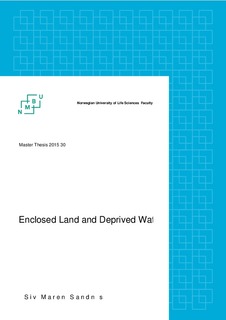| dc.description.abstract | This thesis examines the implications posed to local livelihoods and regional ecosystems by a large-scale agricultural investment in the Kapunga area, localized in the Usangu plains within the Mbarali district, Tanzania. The study contributes to a growing body of research on impacts of land acquisitions, providing a case study with a particular focus on water issues impacting livelihoods and ecosystems as well as issues of land enclosure. The thesis explores how local populations are experiencing the presence of a large-scale rice farm in their area, from the establishment of the farm under state ownership in 1991 to privatization in 2006 and to the present. Further, as the Usangu plains is an area of ecological value comprising the upper catchment of the nationally important Great Ruaha River Basin and Rufiji River Basin, basin-wide ecological impacts of such large-scale agricultural investments are also examined.
The study is based on primary findings gathered during a fieldwork in the Kapunga area in the fall of 2014, qualitative research methods were applied primarily by using semi-structured interviews. Local farmers, pastoralists and fishers were interviewed as well as some particular key informants. Primary findings are combined with secondary literature to give a comprehensive exploration of relevant issues. The empirical findings are coupled with a theoretical framework based on the theory of accumulation by dispossession, supplied with the theory of access and legal pluralism. Unfolding processes of dispossession of productive resources in the study area and describing how the investor is enabled access and control over resources in which local populations are dependent on. These findings are further discussed in the current Tanzanian policy context, which show a clear tendency of facilitating for large- scale agricultural investment amongst other through the SAGCOT initiative.
The thesis reveals that livelihoods in the Kapunga area are deprived of access to adequate water, and subjected to increased competition over land areas due to the large-scale agricultural investment present in their proximity. Basin-wide impacts of large-scale agricultural investments in the study area are evident in reduced dry season water flow in the Ruaha River, which adversely affects important wetlands, biodiversity and not least other water users in the basin. By intensifying competition over resources such as land and water, large-scale agricultural investments in the study area lead to dispossession of resources on local, regional and national levels. | nb_NO |

